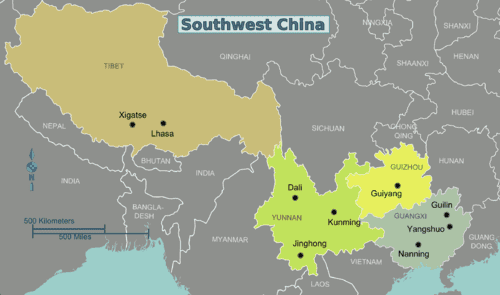Southwest China
Southwest China is the most exotic area of China, home to many minority ethnic groups. It has much in common with Northwest China; both areas are far less prosperous than the eastern and southern coastal regions.
Much of the terrain is quite mountainous. Tibet and Northwestern Yunnan are located on the Tibetan Plateau and have many very high mountains; including the world's highest (Mount Everest) which is located in on the Tibet/Nepalese border. Guizhou and Guangxi have smaller mountains, including the karst limestone terrain, with fantastically gum drop shaped hills, terraced rice fields, and many caves.
Regions
| Guangxi Zhuang Autonomous Region |
| Guizhou Province |
| Tibet Autonomous Region |
| Yunnan Province (Kunming Prefecture, Central Yunnan, Eastern Yunnan, Southeastern Yunnan, Southern Yunnan, Western Yunnan, Northwestern Yunnan) |
Cities
- Dali
- Guilin Guangxi
- Guiyang
- Jinghong
- Kunming Yunnan
- Lhasa Tibet
- Nanning Guangxi
- Xigatse Tibet
- Yangshuo
Stay Safe
According to UNAIDS, 0.5% of Chinese sex workers are infected with HIV. One study reported that 5% of low-cost sex workers were infected. In one part of Yunnan province, the infection rate is estimated to be as high as 7%. The Chinese government has initiated programs to educate sex workers in HIV/AIDS prevention.
Rising HIV/AIDS rates among Chinese's elderly has been partially attributed to the use of sex workers.
China is a huge country that shows a huge regional difference in crime rates but in general it poses no more risk than most western countries. Although you may hear locals complaining about increasing crime rates, violent crime remains rare. Many tourists will more likely feel safer in China than in their home country.
|
Healthcare for foreigners Most major Chinese cities have clinics and hospitals that are more appropriate for foreigners, with English speaking and Western qualified staff. Although expensive, it is worth identifying them whenever you plan to stay in an area for a significant time. For non-urgent medical treatment, you may want to consider traveling to Hong Kong, Taiwan or South Korea for a higher standard of treatment which may not be particularly more expensive. |
Emergency numbers
The following emergency telephone numbers work in all areas of China; calling them from a cell phone is free.
- Patrol Police: 110
- Fire Department: 119
- (Government-owned) Ambulance/EMS: 120
- (some areas private-owned) Ambulance: 999
- Traffic Police: 122
- Directory inquiries: 114
- Consumer Protection: 12315

